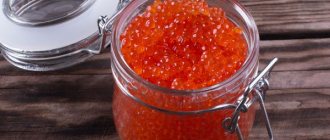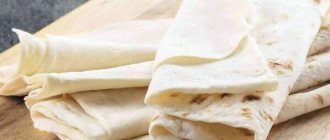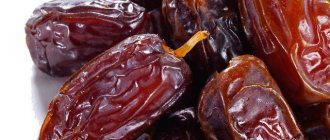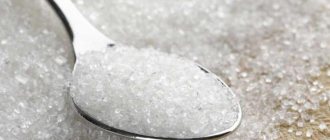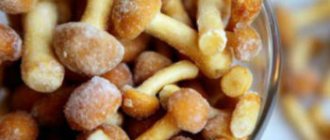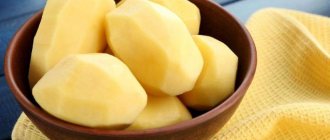Health
Products
Adviсe
Somewhere in hot tropical countries, local residents walk among date palms and enjoy their fresh fruits. What can we do? Buy the dried product in bulk at the market or its packaged version at your nearest store. Nutritionists advise doing this more often, because dates are good for digestion and, if consumed frequently, even help you lose weight. But does this tasty product always bring only benefits?
Let's not answer the question above right away. First, I would like to know your opinion: is it necessary to wash dates? It’s surprising that such a simple question confuses many simply because we have almost never thought about it.
Benefits of dates
Dates have a rich composition. They contain vitamins K, A, folic acid, as well as large amounts of potassium (696 mg per 100 g of product), calcium (64 mg), phosphorus (62 mg) and magnesium (54 mg).
Do you like dates?
Not really
This composition determines the benefits of the fruit:
- Have a beneficial effect on the functioning of the cardiovascular system. Ensure uninterrupted functioning of the heart muscles. Cleanses blood vessels from cholesterol plaques. Remove excess fluid from the body, relieve swelling. Helps prevent heart attack and stroke.
- Have a beneficial effect on intestinal function. Softens stools and promotes gentle bowel cleansing. They are a natural cure for constipation. Helps prevent intestinal cancer.
- Helps strengthen teeth and bones.
- Normalize the functions of the nervous system. Reduce muscle spasms and cramps. Reduce the manifestations of chronic fatigue, eliminate insomnia.
Dates successfully replace sugar and sugar-containing foods in the diet of those who are losing weight. However, despite the fact that eating dried fruits is healthier than eating industrial sweets, it is necessary to observe the measure due to the high calorie content of dates.
Reference. Eating 5-7 dried fruits daily by women for 2 weeks before menstruation can relieve menstrual pain.
Types of dates
Over many years of cultivation, more than 450 types of dates have been bred.
The most common soft varieties are the following:
- Mazfati is a variety that has more than twenty varieties. Fleshy fruits with a caramel flavor, color can range from light brown to almost black. The size of one fruit reaches five centimeters. Dates retain all their beneficial substances throughout the year if the room temperature is within + 5 degrees.
- Kabkab is an Iranian date that is amber in color with a honey flavor. The large fruit reaches a length of 7 centimeters and has an oval shape. At room temperature it can be stored for up to six months, at + 18 the shelf life increases to one and a half years.
- Hasui are quite sweet fruits of brown and dark purple color. They can be stored in an apartment for six months.
- As-sukkari - sweet yellow dates grown in Saudi Arabia. It does not have a long shelf life at above-zero temperatures.
- Anbara is an expensive, elite variety of dates. The fruits are small, three centimeters in diameter, oblong in shape, red-brown in color. They have medicinal properties.
- Khadrawi dates are grown in Iraq. The sweet golden-red fruits reach five centimeters in diameter. Dates are used to make desserts and fruit purees.
- Mujhul is a large dark brown fruit with a thin skin and a distinct caramel aroma.
Durum date varieties include the following:
- Turi is a fruit with a hard, non-sticky skin and dryish pulp. Often used for making salads and baking.
- Zahedi is a sweet date with a pleasant nutty aroma, often used to prepare oriental dishes.
- Sokari is a very sweet fruit; when eaten, you can feel pieces of crystalline sugar.
- Al-Asila - Date palms are native to Saudi Arabia. The harvest from one tree reaches 200 kilograms. The fruit grows up to five centimeters in length and weighs twenty grams, has a coffee-yellow color.
The main exporter of dates is Saudi Arabia, where more than eighteen million date palms grow.
How to eat dates
The fruits of the date palm are traditionally used in cooking in the preparation of dietary recipes. The high sugar content, as well as the viscous and viscous consistency of dates, make it possible to replace not only sugar with them in recipes, but even flour and eggs.
In addition, dried fruits are used as a traditional medicine to treat constipation, anemia, hypertension, and cough.
Do you need to wash dates before eating?
Any dried fruit must be washed before eating. When transported from hot countries, fruits are usually treated with a special gas, which prevents them from spoiling ahead of time. In addition, the consumer does not know under what conditions the fruit was collected and where it was stored before it reached the supermarket counter.
So, how to properly wash dates:
- Remove from the packaging, put in a sieve and first simply moisten with warm running water.
- Apply a special fruit washing product or a little baby liquid soap to the sponge and lightly rub the fruits.
- Rinse off the soap with warm running water.
- At the end, rinse the dried fruits again with boiled or filtered clean water.
- Place the dates on a dry towel and let them dry.
How to choose dates
When choosing these dried fruits in a store, you first need to pay attention to their appearance.
It is worth giving preference to the following fruits:
- have no damage or cracks on the surface;
- the skin is matte and non-sticky, has a medium-brown tint (which means the dates have dried themselves without chemical treatment);
- have a pit (in this case they were minimally processed).
Reference. It is better not to buy pitted dates, since during production they are usually preserved in sweet syrup, which significantly increases the calorie content of an already sweet product and reduces its benefits.
How to store dates at home?
Best storage conditions:
- transparent glass containers, such as a jar or mug with a lid;
- dark and cool place (refrigerator).
It is not advisable to store dried fruits in plastic bags, plastic containers or store packaging. In this case, their shelf life will be significantly reduced.
Do dates strengthen or weaken?
Due to the high content of dietary fiber (6.7 g per 100 g of product), dates are weakened. They are successfully used as a laxative to treat constipation.
Reference! Sometimes it is enough to eat 4-5 fruits to cope with constipation, so you should not overeat dates, otherwise you may get diarrhea.
Calorie content of dates
Dates, like all dried fruits, are a high-calorie product due to the large amount of carbohydrates in their composition. Their calorie content averages about 250 kcal per 100 grams, but can reach up to 280 kcal. This highly nutritious product is included in the diets of people with insufficient body weight.
Those who are on a low-carb diet or control their sugar intake should remember that this fruit contains a large amount of carbohydrates - 75 g per 100 g of product.
Important! Dates have a high glycemic index, meaning their consumption can cause a sharp rise in blood sugar levels.
The amount of dates that an adult healthy, physically active person can eat is no more than 10 fruits per day.
Transportation and processing of dates
So, there are no date palms nearby, so their fruits are supplied from abroad. Most often from Algeria, South Africa, Tunisia, Egypt and Israel. If you've tried drying fruits and berries at home, you know that the process takes a lot of time and you can't dry a lot at one time. But on an industrial scale, the highest temperatures and more are used for this.
Dried dates lose their marketability, and manufacturers decide to bring it back by soaking the dried fruit in a solution of glucose and sugar syrup , which causes even more dirt and germs to stick to the dates. Then the product is treated with sulfur dioxide, fat and edible wax.
This way the product “survives” long-term transportation intact and intact. Now answer the question yourself: do you need to wash dates before eating? Yes, especially if the product is not packaged but sold by weight.
For whom are dates contraindicated?
You should not eat dates, especially in large quantities, if you have the following diseases:
- obesity;
- diabetes mellitus type 2;
- diseases of the gastrointestinal tract in the acute stage (especially colitis, diarrhea, flatulence);
- kidney diseases;
- the presence of an inflammatory process in the oral cavity (caries, periodontitis).
Dates should be consumed with caution:
- Nursing mothers. Products with a high fiber content can cause colic in infants, and sweet dried fruits can provoke allergies.
- Pregnant women, especially in the 1st trimester. Flatulence due to the consumption of dried fruits can provoke increased tone. However, moderate consumption of dates is very beneficial due to their high folic acid content.
Description of dates
The date palm is a vigorous tree, reaching a height of 25 meters, resistant to heat and drought, not picky about the soil, and can even grow on salt marshes. When irrigated, it produces a higher yield. During the daytime, the shoots seem to freeze, escaping the heat, and only with the onset of a cool night do they begin to grow. Each month the plant grows only one new branch, which is why the Egyptians consider it a calendar tree. A palm tree may have one or several strong trunks, large and long, almost half a meter leaves, with sharp spines at the base. Sometimes it can be a squat shrub with pinnately divided leaves. It blooms with small yellow flowers collected in panicle-like clusters. The fruits are not large, they resemble an elongated oval, inside there is one, rather large seed, repeating the shape of the fruit. Depending on the variety, the color of unripe dates varies from yellow to dark red. Due to the large number of fruits, the inflorescences hang down under their weight.
A dioecious plant consists of male and female specimens. To pollinate flowers for two dozen female units, one male representative is enough. Among the palm family, the date ranks second in economic value, second only to the coconut palm. The average annual yield from one tree is about one hundred kilograms. Fruiting begins 10-15 years after planting, and lasts on average up to 150 years. Growing in hot climates, the date palm is valued for the coolness that the shade from the spreading tree provides.
Can children eat dates?
Dates, like any dried fruits, should be introduced into the child’s diet gradually:
- You can give your child dates to try from the age of 1 year. It’s best to start your acquaintance with puree (mash fresh, clean fruit with a fork) or compote (pour the crushed pulp with warm water and let it brew for about an hour).
- As soon as the child has at least 8-10 teeth, you can give the baby a soft fruit to chew.
- Starting from 2 years old, you can add pieces of dates to porridge or baked goods.
Important! When introducing your child to dried fruits for the first time, take the following precautions:
- Do not serve fruits with seeds.
- Feed your child only fresh, well-washed fruits.
- When feeding a small child, give preference to soft fruits with a matte surface.
- For the first time, do not give more than 1-2 teaspoons of date pulp, since an allergic or other individual reaction of the body may occur to any new product.
- Don't let your child overeat dried fruits. This can cause colic and loose stools.
- After eating dates, you need to brush your child’s teeth, since the viscous sweet pulp, remaining on the tooth enamel for a long time, can provoke the development of caries.
So, dates are a universal useful product that alleviates the course of many diseases - strengthens the heart and blood vessels, improves immunity, strengthens teeth and bones, normalizes blood pressure, and eliminates constipation. The main rule is moderation when consuming dates. If eaten in small portions, dried fruits will only benefit the body.
Do I need to rinse dried dates?
Dried fruits go through a very long journey before reaching our table, during which few people monitor the purity of the fruits. In addition, we should not forget how the dates themselves are prepared: they are removed from the trees and dried. And in order to extend the shelf life of the product, after all the manipulations, the dates are additionally treated with edible wax, sugar syrup and sulfur dioxide.
That is why it is important to wash fruits thoroughly, otherwise healthy dates can become dangerous to our health.
Calorie content of dates
Dates of different varieties and processing methods have almost the same amount of calories:
- 100 grams of fresh dates contain 240 kcal
. - Dried dates with pits contain 283 Kcal
, without pits
274 Kcal
. - The most high-calorie date is a dried date with a stone ( 292 Kcal
. - One berry weighing nine grams contains 23 kcal
.
Composition of dates
The composition of dates is rich in fructose, sucrose, and glucose. A large amount of natural sugars supplies the human body with quick energy, which allows you to recover from illness or long-term work.
100 grams of dates contain:
- proteins: 2.5 g;
- fats: 0.5 g;
- carbohydrates: 69.2 g;
- dietary fiber: 6 g;
- organic acids: 0.3 g;
- water: 20 g;
- unsaturated fatty acids: 0.1 g;
- mono- and disaccharides: 69.2 g;
- ash: 1.5 g;
- saturated fatty acids: 0.1 g.
Macronutrients:
- calcium: 65 mg;
- magnesium: 69 mg;
- sodium: 32 mg;
- potassium: 370 mg;
- phosphorus: 56 mg.
Vitamins:
- vitamin PP: 0.8 mg;
- vitamin B1 (thiamine): 0.05 mg;
- vitamin B2 (riboflavin): 0.05 mg;
- vitamin B5 (pantothenic): 0.8 mg;
- vitamin B6 (pyridoxine): 0.1 mg;
- vitamin E (TE): 0.3 mg;
- Vitamin PP (Niacin equivalent): 1.9 mg.
Microelements:
- iron: 1.5 mg.
The fruits of the date tree are rich in vitamins A, B, C, D, K. Minerals: phosphorus, copper, cadmium, iron, potassium, sodium, magnesium, zinc, calcium.
Application
Dates are used in cooking, medicine, and cosmetology.
In medicine
Medicines based on the components of palm trees can also be purchased in our country.
Pollen (extract) of male palm trees is produced in the form of powder or capsules and is recommended for the treatment of infertility, depression, and gastrointestinal disorders.
The fruit extract is sold in powder form and is recommended as an anti-inflammatory and immunomodulatory agent to improve skin condition.
In cosmetology
Date fruits are used to relieve skin inflammation and heal the skin. Due to the anti-inflammatory properties of date seed juice and oil, they are used to prepare various cosmetics: lotions, creams, shampoos, conditioners.
These products contain biologically active substances that nourish, moisturize, protect the skin, make it firm and elastic, and tighten it. Vitamin B5 contained in dates protects hair from brittleness and loss, and fights split ends.
At home, you can make moisturizing masks that make your skin silky. To prepare such a mask, take 6 dates, remove the seeds from them, and grind them to a pasty state. Add 20-25 drops of olive oil, mix thoroughly and apply to cleansed skin for 15-20 minutes. Then wash off with warm water.
In cooking
Since ancient times, date palm fruits have been used to produce wine. Tari wine is prepared from the leaves of the Indian date tree. Such wines are compared to champagne and young grape wines.
In some countries, a drink that tastes like coffee is prepared from roasted and ground seeds.
Desserts are prepared from dates, filled with nuts, candied fruits, marzipan, cheeses and covered with chocolate glaze. Add to meat dishes and cold appetizers. Sugar, flour, honey, and juice are produced from them. They go well with milk and yogurt. Suitable for salads, pilaf, compote, jelly. They are used for making confectionery and baking.
How are dates beneficial?
Dates are useful for cardiovascular diseases and colds. They help normalize the gastrointestinal tract and are recommended for constipation and intestinal disorders.
For medicinal purposes, fruits, pollen, seeds, bark, and leaves of the tree are used.
They have many useful properties:
- Antioxidant;
- Anticancer;
- Hypotensive;
- Hepatoprotective;
- Antibacterial;
- General strengthening;
- Anti-inflammatory;
- Antifungal;
- Antimutagenic.
They have the ability to increase the level of testosterone, red blood cells, hemoglobin, and estrogen. Able to regulate blood glucose levels and maintain acid balance in the body.
